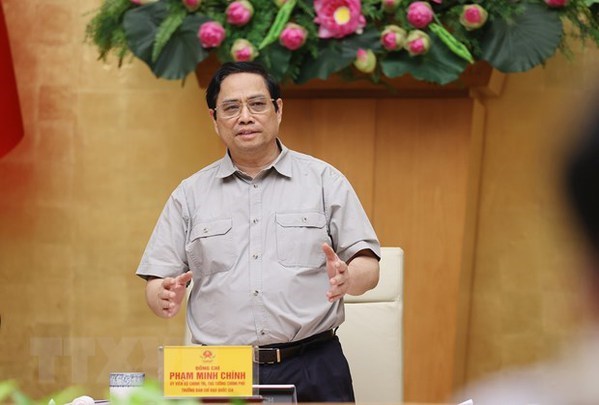Viet Nam aims to return to new normal situation by September 30: PM
The National Steering Committee for COVID-19 Prevention and Control has adjusted the pandemic response strategy in the direction of safely, flexibly adapting to and effectively controlling COVID-19, implementing pandemic control and socio-economic development at the same time, and striving to bring the country back to the new normal situation by the end of September, stated Prime Minister Pham Minh Chinh, who is the head of the committee.
 |
| Prime Minister Pham Minh Chinh addresses the meeting (Photo: VNA) |
The National Steering Committee for COVID-19 Prevention and Control has adjusted the pandemic response strategy in the direction of safely, flexibly adapting to and effectively controlling COVID-19, implementing pandemic control and socio-economic development at the same time, and striving to bring the country back to the new normal situation by the end of September, stated Prime Minister Pham Minh Chinh, who is the head of the committee.
Speaking at an online meeting on September 25 between the steering committee and officials from 10,400 communes, wards and townships, 705 districts, and 63 cities and provinces nationwide, the PM noted that so far, COVID-19 has been gradually put under control in the majority of localities, but complicated developments continue.
Statistics of the committee showed that last week, the number of new cases reduced 9.7 percent to 72,236, while the death toll also fell 12.1 percent compared to the previous week, he said, adding that 16 localities have gone through 14 days without any new infection.
As of September 24, 37.6 million doses of COVID-19 vaccines had been injected, with about 22.3 million people receiving first shots and 7.3 million people getting full two shots, while about 14 million more vaccine doses will continue to be administered, he said
Lauding localities’ efforts in pandemic fight, the Government leader also pointed to outstanding shortcomings in the field, including the ineffective implementation of directions in some localities, particularly at grassroots level, slow testing progress and inefficiency in conducting support policies for pandemic-hit groups.
He asked localities to strengthen decentralisation in pandemic prevention and control activities, taking communes, wards and townships as “fortresses” and people as “warriors” in the fight. They should speed up vaccination, especially targeting those in high-risk areas, he requested.
PM Chinh also urged ministries, sectors and localities to promptly design measures to restore production while continuing to eensure safety against the pandemic.
He assigned the Ministry of Health to gather ideas and build a set of criteria on safely, flexibly adapting to and effectively controlling COVID-19, along with detailed guidelines on its implementation.
Ministries, sectors and localities should immediately set up their task force for socio-economic recovery and development headed by their top leaders, and build their plans for economic recovery in accordance with their own situation, the Government leader requested.
He also asked for the revision of regulations on entry-exit control, thus giving optimal conditions for foreign experts to enter the country for working.
It is necessary to study regulations on the recognition of "vaccine passports", he stressed.
The PM asigned the Ministry of Education and Training and the Ministry of Information and Communications (MIC) to coordinate with localities to ensure telecoms services and computers for students serving online studying. The MIC was requested to promptly develop an app used for all COVID-19 prevention and control activities.
PM Chinh also underlined the need for ministries, sectors and localities to give timely and effective support to pandemic-hit groups in a transparent manner, honoring individuals and organisations with outstanding contributions in pandemic prevention and control, and strictly handling violations in the field.
They also discussed the a draft guidance on safely and flexibly adapting to and effectively controlling the pandemic, focusing on specific criteria, rules and process that serve as the basis for easing social distancing restriction.